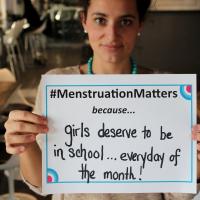Menstruation is an integral and normal part of human existence, but a taboo subject and neglected in most WASH programmes. It's time to better understand challenges around menstrual hygiene management and to act.
Published on: 27/05/2014
By Marielle Snel and Carmen da Silva Wells
What does it really mean to have no toilet and or working tap when you have your period? No access to painkillers or sanitary menstrual materials? How to deal with your period each month when you are ashamed or shunned? Who do you go to to find out how to safely manage menstrual hygiene?
IRC's research with SNV in Ugandan schools showed there is a higher likelihood of adolescent girls staying home during their periods. Girls in the 140 schools surveyed reported missing from 8 to 24 school days per year, resulting in lagging behind or some dropping out of school.
Menstruation is an integral and normal part of life, indeed of human existence. Most of these women and girls menstruate each month between two and seven days, adding up to around 3000 days of menstruation in an average woman's lifetime. But in many places, menstruation is a taboo subject and many negative cultural attitudes are associated with it, including the idea that menstruating women and girls are 'contaminated', 'dirty' and 'impure'.
Especially in rural areas, access to affordable and hygienic sanitary materials is limited. Women and girls resort instead to old rags, dried leaves or grass. Institutional facilities are most often designed without regard to menstrual hygiene needs. For example, schools without private space and wash rooms for girls and inappropriate (or no) facilities for disposal of used pads. Girls and boys also lack accurate information about changes in their bodies as they enter adulthood.
 In spite of these issues, menstrual hygiene has been routinely ignored by professionals in the water, health and education sectors. This year, for the first time, May 28 will be celebrated as Menstrual Hygiene Day. Menstrual Hygiene Day aims to help break the silence and raise awareness about the importance of menstrual hygiene management. The slogan for 2014 is 'Let's start the conversation about menstruation' and WASH United has been organising an engaging social media campaign leading up to the 28th (see #Menstruationmatters ). Many useful resources are available at www.menstrualhygieneday.org
In spite of these issues, menstrual hygiene has been routinely ignored by professionals in the water, health and education sectors. This year, for the first time, May 28 will be celebrated as Menstrual Hygiene Day. Menstrual Hygiene Day aims to help break the silence and raise awareness about the importance of menstrual hygiene management. The slogan for 2014 is 'Let's start the conversation about menstruation' and WASH United has been organising an engaging social media campaign leading up to the 28th (see #Menstruationmatters ). Many useful resources are available at www.menstrualhygieneday.org
Further action research is needed to validate existing data and to engage policy makers, school teachers, parents and children. We need to better understand the situation these girls are facing and how we can help them with the limited resources available. This also includes forging links with the private sector and social entrepreneurs working on low-cost sanitary materials. And learning from WASH programmes where menstrual hygiene management is being addressed (such as BRAC WASH)
In August this year, IRC will present results from the Uganda study at the Menstrual Hygiene Management Conference taking place in Kampala, Uganda. NETWAS Uganda and partners are organising this event to encourage learning about what can be done to improve menstrual management in schools, institutions and communities.
At IRC we use the phrase 'a service delivery approach' as shorthand for our belief that achieving universal access to water and sanitation requires a shift in focus from delivering hardware through projects, to services for everyone. Adopting a service delivery approach implies paying attention to both the hardware (engineering or construction elements) and software (capacity building, institutional support, financial planning) required to provide and sustain a certain level of service.
For safe menstrual hygiene management this entails a comprehensive approach: providing reliable water, functioning toilets, private washrooms and materials such as menstrual pads, as well as education for both girls and boys about menstruation and safe hygiene practices.
Menstrual hygiene education, functioning water and safe and private sanitation facilities together with access to sanitary materials are important factors enabling girls to attend school, even during menstruation. Safe management of menstrual hygiene is fundamental to the dignity and wellbeing of women and girls. It's also part of the basic hygiene, sanitation and reproductive health services to which every woman and girl has a right.
At IRC we have strong opinions and we value honest and frank discussion, so you won't be surprised to hear that not all the opinions on this site represent our official policy.